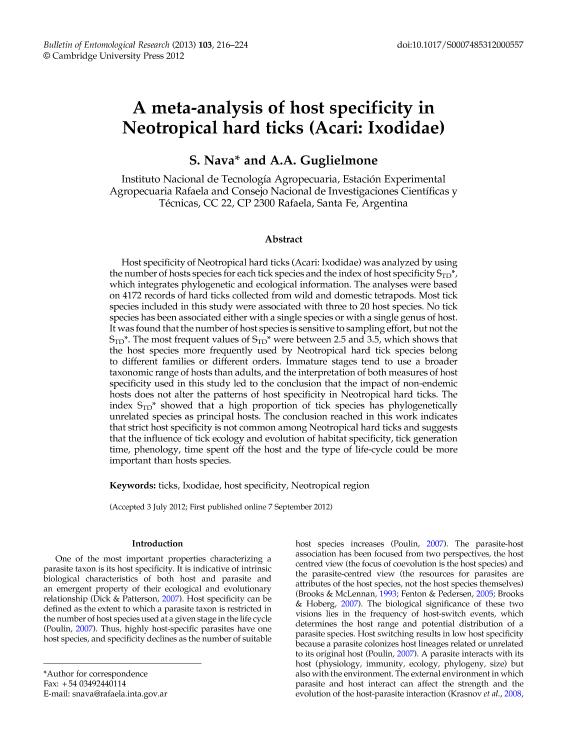Mostrar el registro sencillo del ítem
dc.contributor.author
Nava, Santiago

dc.contributor.author
Guglielmone, Alberto Alejandro

dc.date.available
2016-07-07T20:59:59Z
dc.date.issued
2013-02
dc.identifier.citation
Nava, Santiago; Guglielmone, Alberto Alejandro; A meta-analysis of host specificity in Neotropical hard ticks (Acari: Ixodidae); Cambridge University Press; Bulletin of Entomological Research; 103; 2; 2-2013; 216-224
dc.identifier.issn
0007-4853
dc.identifier.uri
http://hdl.handle.net/11336/6415
dc.description.abstract
Host specificity of Neotropical hard ticks (Acari: Ixodidae) was analyzed by using the number of hosts species for each tick species and the index of host specificity STD*, which integrates phylogenetic and ecological information. The analyses were based on 4172 records of hard ticks collected from wild and domestic tetrapods. Most tick species included in this study were associated with three to 20 host species. No tick species has been associated either with a single species or with a single genus of host. It was found that the number of host species is sensitive to sampling effort, but not the STD*. The most frequent values of STD* were between 2.5 and 3.5, which shows that the host species more frequently used by Neotropical hard tick species belong to different families or different orders. Immature stages tend to use a broader taxonomic range of hosts than adults, and the interpretation of both measures of host specificity used in this study led to the conclusion that the impact of non-endemic hosts does not alter the patterns of host specificity in Neotropical hard ticks. The index STD* showed that a high proportion of tick species has phylogenetically unrelated species as principal hosts. The conclusion reached in this work indicates that strict host specificity is not common among Neotropical hard ticks and suggests that the influence of tick ecology and evolution of habitat specificity, tick generation time, phenology, time spent off the host and the type of life-cycle could be more important than hosts species.
dc.format
application/pdf
dc.language.iso
eng
dc.publisher
Cambridge University Press

dc.rights
info:eu-repo/semantics/openAccess
dc.rights.uri
https://creativecommons.org/licenses/by-nc-sa/2.5/ar/
dc.subject
Ixodidade
dc.subject
Host Specificity
dc.subject
Neotropical Region
dc.subject.classification
Otras Ciencias Veterinarias

dc.subject.classification
Ciencias Veterinarias

dc.subject.classification
CIENCIAS AGRÍCOLAS

dc.title
A meta-analysis of host specificity in Neotropical hard ticks (Acari: Ixodidae)
dc.type
info:eu-repo/semantics/article
dc.type
info:ar-repo/semantics/artículo
dc.type
info:eu-repo/semantics/publishedVersion
dc.date.updated
2016-07-06T15:47:23Z
dc.journal.volume
103
dc.journal.number
2
dc.journal.pagination
216-224
dc.journal.pais
Reino Unido

dc.journal.ciudad
Cambridge
dc.description.fil
Fil: Nava, Santiago. Instituto Nacional de Tecnologia Agropecuaria. Centro Regional Santa Fe. Estacion Experimental Agropecuaria Rafaela; Argentina. Consejo Nacional de Investigaciones Científicas y Técnicas. Centro Científico Tecnológico Santa Fe; Argentina
dc.description.fil
Fil: Guglielmone, Alberto Alejandro. Instituto Nacional de Tecnologia Agropecuaria. Centro Regional Santa Fe. Estacion Experimental Agropecuaria Rafaela; Argentina. Consejo Nacional de Investigaciones Científicas y Técnicas. Centro Científico Tecnológico Santa Fe; Argentina
dc.journal.title
Bulletin of Entomological Research

dc.relation.alternativeid
info:eu-repo/semantics/altIdentifier/url/https://www.cambridge.org/core/journals/bulletin-of-entomological-research/article/metaanalysis-of-host-specificity-in-neotropical-hard-ticks-acari-ixodidae/C5C513467D6C94B36786F523F36CE7B6
dc.relation.alternativeid
info:eu-repo/semantics/altIdentifier/doi/http://dx.doi.org/10.1017/S0007485312000557
Archivos asociados
